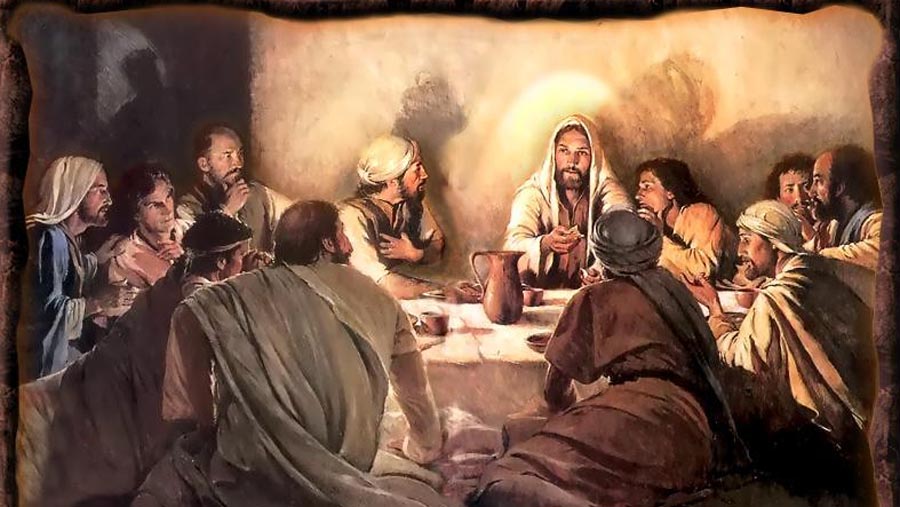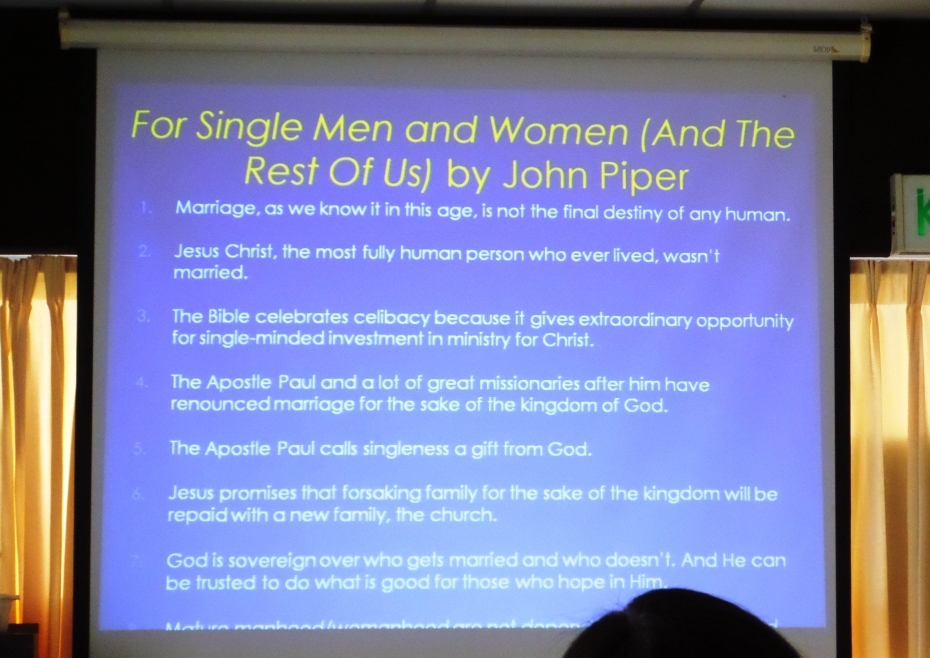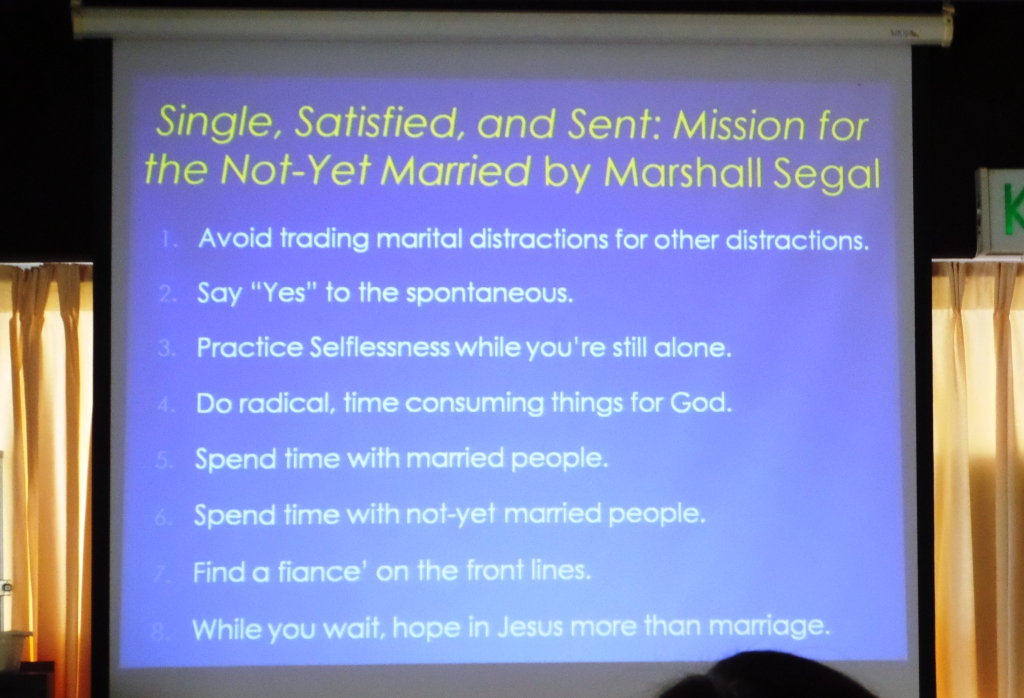
Throughout most of Asia, we live in a patriarchal society. In such societies, an unmarried person is often seen as a ’not-fully matured’ member of it. There is great pressure to get married, and marriage is often regarded as the next step of responsibility for both men and women. Inevitably, those who remain unmarried until comparatively late in life will often be regarded as incomplete or irresponsible.
Even in many churches, we have inherited this model. The pressures in this area are the same, and very often we will get advice from leaders and well-meaning brothers- and sisters- in Christ to seek God for a life partner. What does the Bible have to say about singleness?

Last Saturday, Dr Greg Wilton shared about the Biblical perspective of singleness in a workshop conducted during the BUILD 2015 conference. Dr Greg charted this perspective from the Old Testament until the New Testament. Much insight was gained and also much encouragement.
Old Testament Perspective on Singleness
If we read the Old Testament, it seems that the Bible has few good things to say about singleness. There is the fact that God’s commandment to humanity, represented by Adam and Eve, was to be fruitful and multiply (Genesis 1:27-28).
In Genesis 12, we read about the Abrahamic Covenant between God and Abraham. In Verse 1-3 of the chapter, God promised Abraham that families will be blessed through him. In verse 7, God tells him that the Promised Land will be given unto Abraham’s descendants.

Abraham recognized this promise in terms of having a lineage. In Genesis 15, he despaired over his lack of offspring, and God repeated the pledge, this time by showing Abraham the stars in the sky. That is how many descendants he will have, God said. Through this, we distinguish 3 things that defined the Abrahamic Covenant; Blessings, Land, Offspring.
What does Genesis and the Patriarchs have to do with singleness? Procreation is associated with God’s blessing from the very beginning of creation. Marriage according to the Genesis creation account has two fundamental purposes; companionship (intimacy and assistance) and that is the means and context for procreation of humankind. Up to this point, God’s blessings seem to be strongly connected to the context of offspring.
What does the rest of the Old Testament imply about singleness? Firstly, God’s people were promised fruitfulness of the womb and the land. Marriage, children, and material prosperity in the land were markers of covenantal obedience. In Ruth 1:20-21, Naomi identified that to be devoid of spouse, children, and land was to feel the weight of divine judgment.

Marriage and offspring was necessary for retaining one’s inheritance and offspring. In addition, offspring was necessary for preserving one’s name after death. This was the same in Israel as with all other cultures today.
Dr Greg shared that we have no known examples of those within Israel at that time who voluntarily chose to remain single. To have done so would have been to voluntarily embrace God’s judgment. One visibly single person in the Old Testament was Jeremiah, who was commanded by God to remain single as a direct portent of God’s judgment upon the nation (Jeremiah 16:1-4).
Going through the Old Testament, it seems that the Bible has only dire things to say about singleness. Yet it is also interesting to note that the Apostle Paul, and (except maybe for Peter) we do not hear of the wives of the Disciples of Christ.

What was the expectation of how God would fulfill His promises to Abraham? Abraham saw the blessings through offsprings, from a plural perspective. In Galatians 3:16, however, Paul wrote that God gave his Promise to Abraham and his child. And he clarified further, that the Scripture does not say “to his children” as if to many children, but to “his child” (singular form) and that this was pointing to Christ. What did Paul mean?
The Meaning of Galatians 3:16
Paul was referring to Genesis 22 in which God spoke to Abraham in a very specific context:
“And the angel of the LORD called to Abraham a second time from heaven and said, ‘By myself I have sworn, declares the LORD, because you have done this and have not withheld your son, your only son, I will surely bless you, and I will surely multiply your offspring as the stars of heaven and as the sand that is on the seashore. And your offspring shall possess the gate of his enemies, and in your offspring shall all the nations of the earth be blessed, because you have obeyed my voice.’” Genesis 22:15-18 ESV
This was after Abraham had passed the test of faith in regards to his son Isaac. To understand the exegesis, we can go into the study of Hebrew in which this verse was written, specifically the word zera to denote offspring. The word for seed is zera which is singular in Hebrew.

This word zera may refer to a specific line of descendants, or a collective singular, as in a group (all of Abraham’s descendants). Furthermore, God was referring directly to Abraham when He made the Abrahamic Covenant (Genesis 12:1-3). So essentially Paul exegeted the Old Testament texts accurately and brought out their true meaning.
What has this to do with the singleness issue? It meant that neither marriage nor children is a fundamental marker of being blessed of God in the New Covenant, as all spiritual blessings come through Christ.

Jesus Christ, the Offspring of God, is Himself in His atoning and reconciling work, the vehicle of God’s blessing to the world. It is a divine blessing, made in a spiritual context. How do we receive the blessings then? Not through marriage but through Christ.
Singleness under the New Covenant
What did Jesus Himself says about singleness? Jesus revealed to the disciples in Matthew 19:10-12 that the idea that it may be better not to marry is a big idea that not all can embrace. But He also went on to say that there are some who willingly give up marriage, children, and sexual relations for the sake of the Kingdom of God. Concluding, He affirms that those who can embrace this should do so.
In Luke 20:34-36, Jesus said that marriage is for people here on earth. In the age to come, however, those who are worthy to be raised from the dead will neither marry nor be given in marriage. There may be strong evidence that Jesus wants us to prioritize the new family in Christ over the old family.

What did Paul then say about singleness? In 1 Corinthians 7, he gave detailed instructions on marriage. Several pieces of advice can be brought out. Firstly, in the way we treat or regard singles. The capability to remain single must be regarded as a spiritual gift.
This single life is and should be characterized by 3 dominant features:
-
A life of simplicity free from the stresses of spouse and family. -
A life that finds sufficiency in the blessings of Christ alone apart from the experiences of sexual intimacy, marital companionship, and physical family. -
A life ready and free for service to God in whatever way He should call.
Dr Greg shared that singleness is a season everyone go through. Every person who is married was once single people. While we’re still single, we should make the best of the season. Make best use of the freedom and go and bless others. Travel and seek for new environments in which we can share the Good News of God. Connect with people and see how you can be a blessing to the community wherever we go.
Several practical pointers were also shared from articles by John Piper and Marshall Segal:

Marshall Segal offers some practical tips for the Not-yet Married:

|Share The Good News|
Jason Law




Leave a Reply